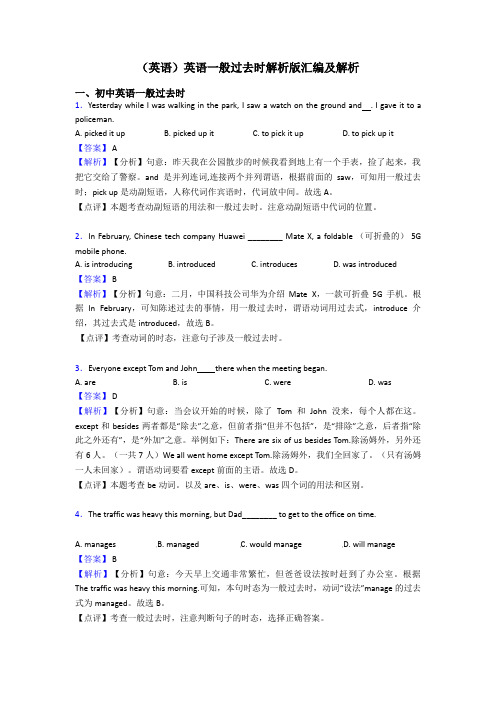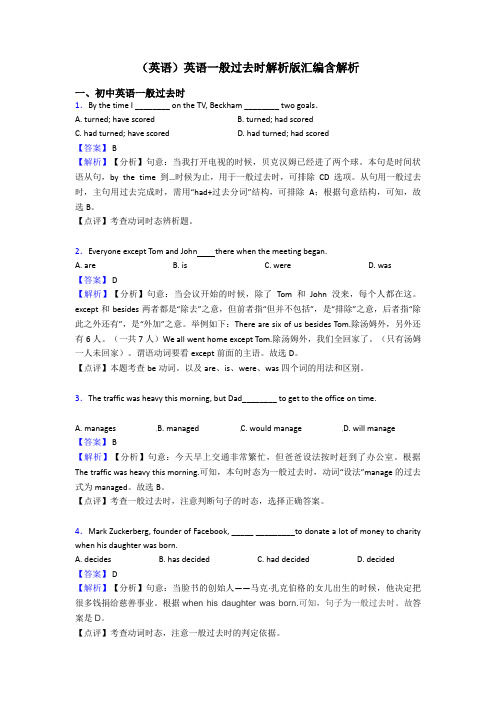(英语)英语试卷英语一般过去时题分类汇编及解析(1)
(英语)英语一般过去时解析版汇编及解析

(英语)英语一般过去时解析版汇编及解析一、初中英语一般过去时1.Yesterday while I was walking in the park, I saw a watch on the ground and . I gave it to a policeman.A. picked it upB. picked up itC. to pick it upD. to pick up it【答案】 A【解析】【分析】句意:昨天我在公园散步的时候我看到地上有一个手表,捡了起来,我把它交给了警察。
and是并列连词,连接两个并列谓语,根据前面的saw,可知用一般过去时;pick up是动副短语,人称代词作宾语时,代词放中间。
故选A。
【点评】本题考查动副短语的用法和一般过去时。
注意动副短语中代词的位置。
2.In February, Chinese tech company Huawei ________ Mate X, a foldable (可折叠的) 5G mobile phone.A. is introducingB. introducedC. introducesD. was introduced【答案】 B【解析】【分析】句意:二月,中国科技公司华为介绍Mate X,一款可折叠5G手机。
根据In February,可知陈述过去的事情,用一般过去时,谓语动词用过去式,introduce介绍,其过去式是introduced,故选B。
【点评】考查动词的时态,注意句子涉及一般过去时。
3.Everyone except Tom and John there when the meeting began.A. areB. isC. wereD. was【答案】 D【解析】【分析】句意:当会议开始的时候,除了Tom和John没来,每个人都在这。
except和besides两者都是“除去”之意,但前者指“但并不包括”,是“排除”之意,后者指“除此之外还有”,是“外加”之意。
(英语)中考英语一般过去时真题汇编(含答案)及解析

(英语)中考英语一般过去时真题汇编(含答案)及解析一、初中英语一般过去时1.—I am sorry I _______ my exercise book at home.— Don't forget _______ it to school tomorrow.A. forget; to takeB. left; to bringC. forgot; to bringD. left; to take【答案】A【解析】【分析】forget忘记;leave留下;bring带来;take带走。
句意:抱歉,我把我的练习本忘在家里了。
——明天不要忘了把它带到学校来。
Forget后接动名词表示忘记做过的某事,接不定式是忘记去做某事,结合语境可知上文描述的是刚才发生的动作,故从句谓语动词用过去时态,下文表示不要忘记做某事,选A。
【点评】该题型是属于基础题型,是必考内容。
英语动词同汉语一样具有一词多义,一词多性的特点。
解答此类问题首先要理解每个单词的基本含义,并注意交叉含义间的区别,了解其特殊用法及习惯搭配等特点,然后结合语境选择正确答案。
英语宾语从句的时态和主句没有必然的联系,需结合语境进行具体分析。
2.— Where did you go last weekend?— I to the Great Wall.A. goB. wentC. will goD. have gone【答案】B【解析】【分析】句意:——上个周末你去哪里了?——我去长城了。
A,go一般现在时。
B,went一般过去时C,will go一般将来时。
D,have gone现在完成时。
据时间状语last weekend可知此处用一般过去时,故用动词的过去式went。
故选B。
【点评】本题考查一般过去时。
以及go、went、will go、have gone四种事态的用法和区别。
3.— Are you a basketball player in your school ?— Yes. I ______________ the team 3 years ago. I ______________ in it for 3 years.A. joined; wasB. was joined; amC. have joined; have beenD. joined; have been【答案】 D【解析】【分析】句意:——你是你们学校的篮球运动员吗?——是的,三年前我加入了这个团队,我在里面呆了3年。
(英语)英语一般过去时解析版汇编含解析

(英语)英语一般过去时解析版汇编含解析一、初中英语一般过去时1.By the time I ________ on the TV, Beckham ________ two goals.A. turned; have scoredB. turned; had scoredC. had turned; have scoredD. had turned; had scored【答案】 B【解析】【分析】句意:当我打开电视的时候,贝克汉姆已经进了两个球。
本句是时间状语从句,by the time到…时候为止,用于一般过去时,可排除CD选项。
从句用一般过去时,主句用过去完成时,需用“had+过去分词”结构,可排除A;根据句意结构,可知,故选B。
【点评】考查动词时态辨析题。
2.Everyone except Tom and John there when the meeting began.A. areB. isC. wereD. was【答案】 D【解析】【分析】句意:当会议开始的时候,除了Tom和John没来,每个人都在这。
except和besides两者都是“除去”之意,但前者指“但并不包括”,是“排除”之意,后者指“除此之外还有”,是“外加”之意。
举例如下:There are six of us besides Tom.除汤姆外,另外还有6人。
(一共7人)We all went home except Tom.除汤姆外,我们全回家了。
(只有汤姆一人未回家)。
谓语动词要看except前面的主语。
故选D。
【点评】本题考查be动词。
以及are、is、were、was四个词的用法和区别。
3.The traffic was heavy this morning, but Dad________ to get to the office on time.A. managesB. managedC. would manageD. will manage【答案】 B【解析】【分析】句意:今天早上交通非常繁忙,但爸爸设法按时赶到了办公室。
(英语)英语专题汇编英语一般过去时(一)

(英语)英语专题汇编英语一般过去时(一)一、初中英语一般过去时1.What a day! The car I ___________ seems to go wrong again.A. have repaired itB. had repairedC. had repaired itD. have it repaired【答案】 B【解析】【分析】句意:多么糟糕的一天呀!我让人修好的车又坏了。
这里I had repaired 是定语从句,先行词是前面的名词car,关系词that或which在定语从句中作宾语省略了,it也是指代the car,所以定语从句中关系词代替先行词了,it必须去掉。
故选B。
2.—My car ________ yesterday. Could you please give me a ride tomorrow?—I'm sorry I can't, I'm ________ Dalian tomorrow morning.A. breaks down; flying atB. has broken down; flying atC. broke down; flying toD. had broken down; flying to【答案】 C【解析】【分析】句意:——我的车坏了,你明天能搭我一程吗?——对不起我不能,我明天早上要坐飞机去大连。
break down,出毛病,出故障,根据yesterday,可知用一般过去时,break的过去式是broke,根据tomorrow morning,可知用一般将来时,一些表示移动的动词可以用be+doing,表将来时,故选C。
【点评】考查动词的时态。
注意根据时间状语确定动词时态。
3.—Have you ever been to South Tower Park?—Yes. I ___________there a few months ago.A. wentB. have beenC. have gone【答案】A【解析】【分析】句意:—你曾经去过南塔公园吗?—是的,几个月前我去那儿了。
(英语)中考英语一般过去时真题汇编(含答案)精选全文

精选全文完整版(可编辑修改)(英语)中考英语一般过去时真题汇编(含答案)一、初中英语一般过去时1.He___________ his grandparents in the countryside last week.A. visitsB. visitC. visited【答案】C【解析】【分析】句意:上周,他拜访了在农村的祖父母。
A. visits 单数第三人称形式; B. visit 动词原形;C. visited一般过去式。
因为句中有一般过去式的标志性短语:last week.,故答案选C。
【点评】考查动词的时态,注意句中的时间状语。
2.—Sorry, I your dictionary yesterday.—It doesn't matter.A. took; by handB. took; by mistakeC. got; by accidentD. brought; in this way【答案】 B【解析】【分析】句意:——抱歉,昨天我由于差错拿走了你的字典。
——没关系。
yesterday昨天,和一般过去时连用,take:带走,bring:带来,get:得到,by mistake:由于差错,by hand:手工,in this way:以这种方式,根据句意可知答案,故选B。
【点评】考查动词的时态,辨析和短语。
根据语境判断句意,选出恰当的选项。
3.Yao Ming, a basketball giant, ___________ water polo when he was young.A. is playingB. used to playC. is used to playingD. was playing【答案】 B【解析】【分析】句意:姚明,一个篮球天才,当他年轻时经常玩水球运动。
根据when he was young,可知句式时态是一般过去时,used to do sth.过去经常做某事;be used to doing,习惯做某事,故选B。
(英语)中考英语一般过去时真题汇编(含答案)

英语)中考英语一般过去时真题汇编(含答案)一、初中英语一般过去时1.He _________ his grandparents in the countryside last week.A. visitsB. visitC. visited【答案】C【解析】【分析】句意:上周,他拜访了在农村的祖父母。
A. visits 单数第三人称形式; B. visit 动词原形;C. visited 一般过去式。
因为句中有一般过去式的标志性短语:last week. ,故答案选C。
【点评】考查动词的时态,注意句中的时间状语。
2.—Sorry, I your dictionary yesterday. —It doesn't matter.A. took; by handB. took; by mistakeC. got; by accidentD. brought; in this way【答案】B【解析】【分析】句意:——抱歉,昨天我由于差错拿走了你的字典。
——没关系。
yesterday 昨天,和一般过去时连用,take:带走,bring :带来,get:得到,by mistake:由于差错,by hand :手工,in this way :以这种方式,根据句意可知答案,故选B。
【点评】考查动词的时态,辨析和短语。
根据语境判断句意,选出恰当的选项。
3.Yao Ming, a basketball giant, _________ water polo when he was young.A. is playingB. used to playC. is used to playingD. was playing【答案】B【解析】【分析】句意:姚明,一个篮球天才,当他年轻时经常玩水球运动。
根据when he was young ,可知句式时态是一般过去时,used to do sth.过去经常做某事;be used to doing ,习惯做某事,故选B。
(英语)英语一般过去时真题汇编(含答案)及解析
(英语)英语一般过去时真题汇编(含答案)及解析一、初中英语一般过去时1.He almost fell down. But he _____.A. didn'tB. doesn'tC. won't【答案】 A【解析】【分析】句意:他几乎摔倒,但是他没有。
前句动词fell是fall的过去式,说明句子用的一般过去时态,后句也还是对那件事的描述,还是用一般过去时态,否定:动词前面加didn't,同时把动词变为原形。
故选A。
2.Everyone except Tom and John there when the meeting began.A. areB. isC. wereD. was【答案】 D【解析】【分析】句意:当会议开始的时候,除了Tom和John没来,每个人都在这。
except和besides两者都是“除去”之意,但前者指“但并不包括”,是“排除”之意,后者指“除此之外还有”,是“外加”之意。
举例如下:There are six of us besides Tom.除汤姆外,另外还有6人。
(一共7人)We all went home except Tom.除汤姆外,我们全回家了。
(只有汤姆一人未回家)。
谓语动词要看except前面的主语。
故选D。
【点评】本题考查be动词。
以及are、is、were、was四个词的用法和区别。
3.— Where did you go last weekend?— I to the Great Wall.A. goB. wentC. will goD. have gone【答案】B【解析】【分析】句意:——上个周末你去哪里了?——我去长城了。
A,go一般现在时。
B,went一般过去时C,will go一般将来时。
D,have gone现在完成时。
据时间状语last weekend可知此处用一般过去时,故用动词的过去式went。
故选B。
英语一般过去时的题目及答案
英语一般过去时的题目及答案一、填空题1.She ______ (go) to the library yesterday.Answer: went2.They ______ (have) a great time at the party last night.Answer: had3.I ______ (see) that movie three times.Answer: saw4.He ______ (play) football with his friends at the park.Answer: played5.We ______ (visit) the museum on Sunday.Answer: visited二、选择题1.What _____ you do last weekend?A. doB. didC. doesAnswer: B. did2.My friends _______ a concert last night.A. goB. wentC. goesAnswer: B. went3.She ______ her homework after school yesterday.A. finishB. finishedC. finishesAnswer: B. finished三、改错题1.She eated lunch an hour ago.Corrected: She ate lunch an hour ago.2.They goed to the movies last Friday.Corrected: They went to the movies last Friday.3.He talk to the teacher after class.Corrected: He talked to the teacher after class.四、连线题Match the past form of the verbs with their base form:1.eat A. wrote2.run B. drank3.find C. ran4.write D. ate5.drink E. foundAnswers: 1 - D, 2 - C, 3 - E, 4 - A, 5 - B五、现在完成时和一般过去时比较Explain the difference between the Present Perfect and Simple Past tense using the following example:。
最新中考英语分类汇编过去将来时一般过去时经典
最新中考英语分类汇编过去将来时一般过去时经典一、过去将来时1.I go out to have a walk when they opened the door.A. am about toB. was about toC. went toD. have to【答案】 B【解析】【分析】句意:他们开门时我正要出去散步。
根据句意,可知我还没有出去,是打算出去散步,故排除C和D,又因为when后用的是一般过去式,故句子要用一般过去式,”be about to do sth将要做某事“的过去将来时为was/ were about to,主语I,故用be 动词was,因此选B。
【点评】考查过去将来时。
注意识记be about to do sth的用法。
2.—What did your son say in the letter?—He told me that he __________ the Great Wall the next day.A. will visitB. has visitedC. is going to visitD. would visit【答案】 D【解析】【分析】句意:你的儿子在信中说什么?他告诉我他第二天要去参观长城.结合语境可知从句描述的是站在过去角度看将来发生的动作,故用过去将来时态,故选D.【点评】英语中的时态主要是借助于时间状语与上下文语境来进行判断。
解答此类题型,首先要注意句子中的时间状语,如果没有则要通过分析上下文,结合语境来判断句子的时态。
英语疑问句中一般具有时态上的对应关系,注意结合这一特点进行区分。
3.Mr. Wu said he ______ us to the zoo the next week.A. would takeB. will takeC. takeD. takes【答案】 A【解析】【分析】通过分析本句可知,本句是一个宾语从句。
根据next week可知,从句应该将来时,故排除CD;在宾语从句中,主句用过去时,则从句也应该用过去时的某种形式,故用would take。
【英语】英语一般过去时真题汇编(含答案)及解析
【英语】英语一般过去时真题汇编(含答案)及解析一、初中英语一般过去时1.The old man _________________ Bajin was a famous writer.A. was calledB. is calledC. calledD. calls【答案】 C【解析】【分析】句意:老人巴金是一位著名的作家。
谓语动词是was,故此处缺少非谓语动词,call与man是被动关系,故是过去分词用后置定语,故选C。
【点评】考查非谓语动词,注意过去分词的用法。
2.—Linda hasn't come to the party yet.—But she . I think I have to call her again.A. promisesB. promisedC. will promise【答案】 B【解析】【分析】句意:——琳达还没来参加聚会。
——但她答应了。
我想我得再给她打个电话。
根据 I think I have to call her again. 我得再给她打个电话。
可知她答应了,应用一般过去时,故选B。
【点评】考查动词一般过去时的用法。
3.— Where did you go last weekend?— I to the Great Wall.A. goB. wentC. will goD. have gone【答案】B【解析】【分析】句意:——上个周末你去哪里了?——我去长城了。
A,go一般现在时。
B,went一般过去时C,will go一般将来时。
D,have gone现在完成时。
据时间状语last weekend可知此处用一般过去时,故用动词的过去式went。
故选B。
【点评】本题考查一般过去时。
以及go、went、will go、have gone四种事态的用法和区别。
4.— Are you a basketball player in your school ?— Yes. I ______________ the team 3 years ago. I ______________ in it for 3 years.A. joined; wasB. was joined; amC. have joined; have beenD. joined; have been【答案】 D【解析】【分析】句意:——你是你们学校的篮球运动员吗?——是的,三年前我加入了这个团队,我在里面呆了3年。
- 1、下载文档前请自行甄别文档内容的完整性,平台不提供额外的编辑、内容补充、找答案等附加服务。
- 2、"仅部分预览"的文档,不可在线预览部分如存在完整性等问题,可反馈申请退款(可完整预览的文档不适用该条件!)。
- 3、如文档侵犯您的权益,请联系客服反馈,我们会尽快为您处理(人工客服工作时间:9:00-18:30)。
(英语)英语试卷英语一般过去时题分类汇编及解析(1)一、初中英语一般过去时1.- Did you go to Li Lei's birthday party? - No, I ___________.A. am not invitedB. don't invite himC. wasn't invitedD. haven't invited【答案】 C【解析】【分析】句意:——你去参加李雷的生日聚会了吗?——没有,我没有被邀请。
根据句意可知用一般过去时的被动结构,故选C。
【点评】考查动词的时态和语态。
2.The traffic was heavy this morning, but Dad________ to get to the office on time.A. managesB. managedC. would manageD. will manage【答案】 B【解析】【分析】句意:今天早上交通非常繁忙,但爸爸设法按时赶到了办公室。
根据The traffic was heavy this morning.可知,本句时态为一般过去时,动词“设法”manage的过去式为managed。
故选B。
【点评】考查一般过去时,注意判断句子的时态,选择正确答案。
3.—Have you ever been to South Tower Park?—Yes. I ___________there a few months ago.A. wentB. have beenC. have gone【答案】A【解析】【分析】句意:—你曾经去过南塔公园吗?—是的,几个月前我去那儿了。
have been to曾经去过某地;have gone to去某地了;根据a few months ago.可知用一般过去时,动词用过去式,故选A。
【点评】考查动词时态辨析。
根据时间状语确定合适的动词。
4.—Do you know who invented lights?—Yes, they by Edison.A. inventedB. are inventedC. were inventedD. was invented【答案】 C【解析】【分析】句意:——你知道谁发明了电灯吗?——是的,它们是被爱迪生发明的。
A. invented发明,一般过去时态;B. are invented被邀请;一般现在时态的被动语态;C. were invented被邀请,一般过去时态的被动语态;D. was invented被邀请,一般过去时态的被动语态,单数。
电灯的发明已成为过去,这里是一般过去时态的被动语态,主语是复数,这里用were done的形式。
根据句意,故答案为C。
【点评】考查被动语态。
注意一般过去时态被动语态的构成。
5.—Great changes have taken place in our hometown over the past years.—Yeah. Things ______different when we were young.A. have beenB. areC. will beD. were【答案】D【解析】【分析】句意:——在过去的几年里,我们家乡发生了巨大的变化。
——是的。
我们年轻时情况不同。
根据后文when we were young可知,本句时态为一般过去时,用were。
故选D。
【点评】考查一般过去时,注意根据时间状语或其他动词的时态,判断考查的时态。
6.—Have you ever climbed Mount Tai, Carol?—Yes. I ______ in Taian for a week last year and reached the top of it twice.A. had stayedB. stayC. stayedD. have stayed【答案】C【解析】【分析】句意:--卡罗,你曾经爬过泰山吗?--是的,我去年在泰安呆了一周,并且两次到达山顶。
last year,去年,过去的时间,又and连接的是两个并列的动作,所以应该用一般过去时态的。
had stayed,过去完成时态;stay,一般现在时;stayed一般过去时;have stayed,现在完成时,结合句意,故选C。
【点评】考查时态辨析,last+时间是一般过去时的标志词之一。
7.— Do you know yesterday?—Yes. She was ill in hospital.A. why didn't Jenny go to schoolB. why doesn't Jenny go to schoolC. why Jenny didn't go to schoolD. why Jenny doesn't go to school【答案】C【解析】【分析】句意:——你知道詹妮昨天为什么没去上学吗?——是的,她生病住院了。
根据yesterday,昨天,可知用一般过去时,宾语从句的语序要用陈述语序,故选C。
【点评】考查宾语从句。
8.—Have you ever been to Shanghai?—Of course. Actually, I _________there for six years but now I live in Taizhou.A. workedB. was workingC. would workD. have worked【答案】 A【解析】【分析】句意:——你去过上海吗?——当然。
事实上,我在那里工作了六年,但是现在我住在泰州。
根据答语 but now I live in Taizhou. 但是现在我住在泰州,可知在上海工作为过去发生的事情,时态应用一般过去时,work的过去式为worked,故选A。
【点评】考查一般过去时。
注意根据时间状语判断句子的时态,选择正确答案。
9.—Have you seen my brother?—Yes. I _____ him in the library five minutes ago.A. metB. have metC. meetD. have been met【答案】 A【解析】【分析】句意:---你看到我哥哥了吗?---是的,我五分钟前在图书馆遇到他了。
ago是一般过去时的标志,故答案为A。
【点评】考查动词的时态,理解句子,根据句中的时间状语判断时态。
10.—When _______ you _______ your homework?—I had finished it before he _______ back.A. have; finished; cameB. have; finished; was comingC. did; finish; cameD. did; finish; was coming【答案】 C【解析】【分析】考查时态。
根据语境知,询问的是完成作业的时间,故用一般过去时。
句意:——你什么时候完成的作业?——在他回来之前我就完成了。
故选C。
11.-Have you finished your homework?-Yes, I have. I it this morning.A. finishB. finishesC. finishedD. have finished【答案】C【解析】【分析】句意:你完成你的作业了吗?——是的,我完成了。
我今天早晨完成的。
结合语境可知下文描述的是过去某时发生的动作,故用一般过去时态。
选C。
【点评】英语中的时态主要是借助于时间状语与上下文语境来进行判断。
解答此类题型,首先要注意句子中的时间状语,如果没有则要通过分析上下文,结合语境来判断句子的时态。
英语疑问句中一般具有时态上的对应关系,注意结合这一特点进行区分。
12.Jake _____his key in the office so he had to wait until his wife _______ home.A. has forgotten … comesB. forgot… comeC. had left… cameD. had left…would come【答案】 C【解析】【分析】句意:杰克把他的钥匙丢在办公室了,因此他不得不等到他的妻子回家。
结合语境可知前文描述的是过去某时前已经完成的动作,故用过去完成时态。
下文指的是过去某时的动作,故用一般过去时态。
选C。
【点评】英语中的时态主要是借助于时间状语与上下文语境来进行判断。
解答此类题型,首先要注意句子中的时间状语,如果没有则要通过分析上下文,结合语境来判断句子的时态。
13.As we all know, the Silk Road _______ China to the west in ancient times.A. connectsB. connectedC. will connectD. is connecting【答案】B【解析】【分析】句意:众所周知,在古代丝绸之路是连接中国和西方的。
In ancient times“在古代”,因此要用一般过去式。
结合句意,故选B。
【点评】考查动词时态。
14.2016•连云港)—Did Billy and Anna find a way out at last?—Yes, they a plan and did it.A. were working outB. worked outC. are working outD. have worked out【答案】 B【解析】【分析】考查动词的时态。
句意:—比利和安娜最后找到了方法了吗?—是的,他们做好了计划并且找到了方法。
根据and后的动词did可知,空格处也应该用一般过去时。
故选B。
15. __ terrible environment! The pollution here is even more serious than I __ .A. What a; thoughtB. How; thinkC. What an; thinkD. How; thought【答案】 A【解析】【分析】句意:多么糟糕的环境啊!这里的污染比我想的更严重。
What 和How 都可以引导感叹句,其句型是what +a/an+形容词+可数名词单数或者what +形容词+可数名词复数或不可数名词;how +形容词+a/an+可数名词单数或how +形容词或副词。
第一个空修饰的是名词environment,是可数名词单数,故用what;根据句意可知,我所想的应是过去所想,现在已经看到了这里的环境,故第二个空应用一般过去时态。
